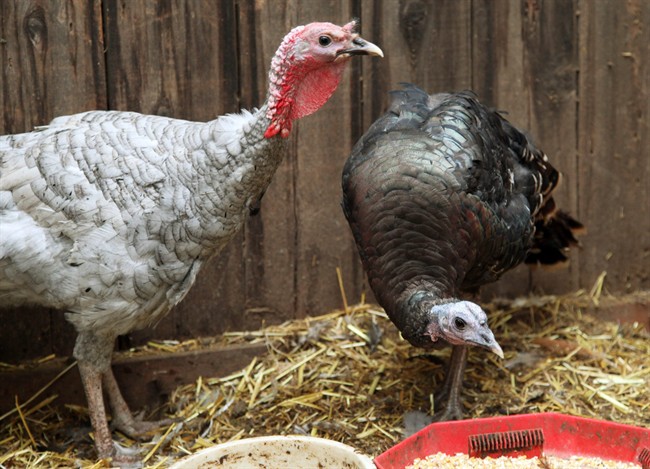LANGLEY, B.C. – B.C. poultry farmers are ready to declare the end of the deadly avian flu outbreak, although they still face a long road to recovery and a constant threat from wild birds.

The president of a group representing farmers who raise turkeys, chickens and eggs said it has been three weeks since the last commercial farm was infected and the virus has been contained.
“The industry feels quite comfortable that the immediate threat is under control or has been contained,” said Ray Nickel of the B.C. Poultry Association. “Enough time has passed that we would no longer be concerned about spread.”
The highly pathogenic strain of H5N2 struck at the beginning of December and infected 11 sites in the Fraser Valley. Nearly 250,000 birds are dead or set to be euthanized.
Nickel said B.C. poultry farmers still face a “serious threat” from migratory birds in Washington state that have been found to carry the virus.
“Those birds don’t necessarily obey existing border controls,” he said. “They are spreading (the virus) in the environment. We don’t know exactly where but it’s obviously in and around where we do our poultry farming business.”

Get breaking National news
He added that farms have biosecurity measures in place that are designed to prevent new infections.
However, a statement from the Canadian Food Inspection Agency said it would be “premature” to declare the outbreak over and it is still assessing the situation.
The CFIA continues its activities including disease surveillance, disposal of birds, cleaning and disinfection of barns, and safely moving poultry, the statement said.
The 11 sites that were infected with the virus still face a long and difficult process of recovery.
Six of the sites are in the final stage of the flu process, meaning they have begun washing and disinfecting their barns. Once the cleanup has been approved by the Canadian Food Inspection Agency, those farmers will have to wait another three weeks until they can restock.
The remaining five farms are still undergoing a “bio-heat” process designed to eliminate the virus through high temperatures.
“We hope that we could be back up and fully running in six weeks but I can’t tell you what that number exactly looks like,” said Nickel.
The most serious avian flu outbreak in B.C. occurred in 2004 where a highly-contagious H7N3 strain of the virus spread to 42 commercial farms. Health officials ordered the slaughter of 17 million birds.
Nickel said that biosecurity and emergency management measures introduced after the 2004 outbreak helped to control the spread of the virus this time. They include strict procedures around locked gates, changing footwear and monitoring entrances and exits.
He said the industry was just beginning to review the recent outbreak and figure out ways to improve. Nickel said he hopes to be able to contain infections to just a single farm in the future.
“We’re not bulletproof, so we know that there’s risk and there could possibly be a breach or an infection …. We would like to know that we could possibly contain it to that particular site,” he said.
“On the other hand, 11 is a whole lot less than 42, and to have successfully held it to that is a testimony to the program and how everybody is able to make it work.”







Comments